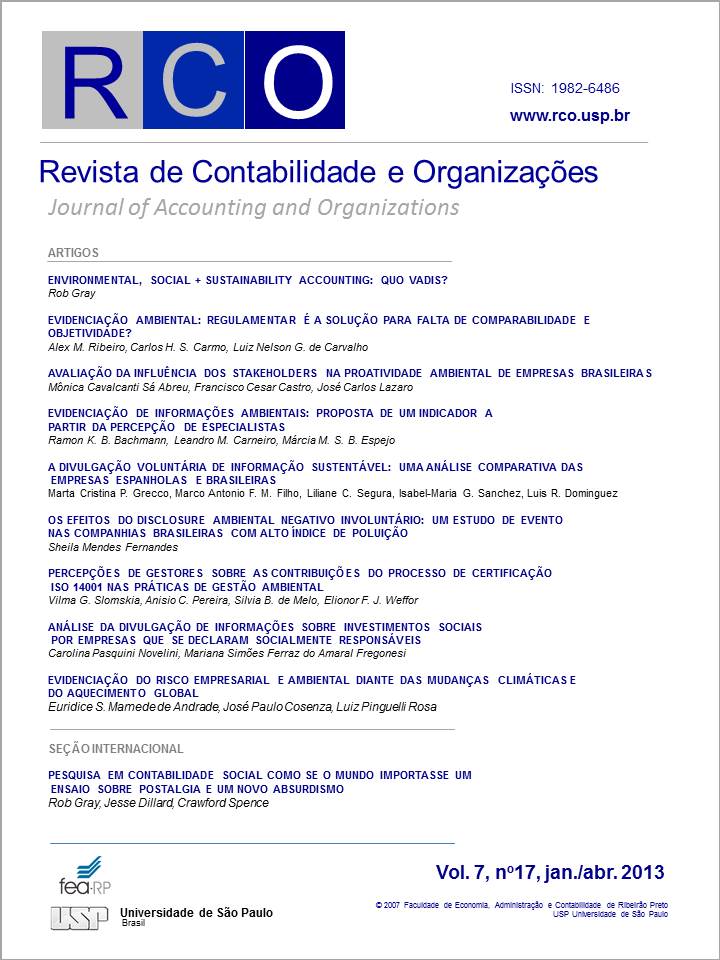ENVIRONMENTAL INFORMATION DISCLOSURE: A PROPOSED INDICATOR BASED ON EXPERTS’ PERCEPTIONS
DOI:
https://doi.org/10.11606/rco.v7i17.56666Keywords:
Attributes, Environmental Disclosure, Disclosure Indicator, Sustainability.Abstract
This paper is aimed at listing environmental attributes, according to the degree of importance of disclosure, to compose a truly Brazilian indicator that assesses the quality of environmental information disclosure. “Environmental accounting/sustainability” experts and environmental disclosure attributes were selected, based on Brazilian and international studies. Through Delphi rounds, the experts outlined the list of the most relevant attributes to compose the indicator. The Environmental Disclosure Indicator – EDI consists of ten attributes than combine practicality and representativeness of the quality of environmental information disclosure. The results revealed a high degree of importance and, therefore, a greater weight of qualitative attributes, such as “Environmental Impacts of Products and Processes” and “Information about Residues”. The study contributes by revealing “what” should be disclosed prioritarily, that is, which are the essential environmental attributes. It contributes to verify whether the amount of environmental information companies have disclosed have necessarily meant disclosure quality. As it provides an instrument to quantify the quality of environmental disclosure, the study permits further research about the association between this disclosure and other company aspects, such as performance and corporate governance.Downloads
Downloads
Published
Issue
Section
License
The RCO adopts the Free Open Access policy, under the standard Creative Commons agreement (CC BY-NC-ND 4.0). The agreement provides that:
- Submission of text authorizes its publication and implies commitment that the same material is not being submitted to another journal. The original is considered definitive.
- Authors retain the copyright and grant the journal the right of first publication, with the work simultaneously licensed under the Creative Commons Attribution License which allows the sharing of the work with acknowledgment of authorship and initial publication in this journal.
- Authors are authorized to take additional contracts separately, for non-exclusive distribution of the version of the work published in this journal (e.g. publish in an institutional repository or as a book chapter), with necessary recognition of authorship and initial publication in this journal.
- Authors are allowed and encouraged to publish and distribute their work online (e.g. in institutional repositories or on their personal page) before or during the editorial process, as this can generate productive changes as well as increase the impact and citation of published work (See The Effect of Free Access).
- The journal does not pay copyright to the authors of the published texts.
- The journal's copyright holder, except those already agreed in the Free Open Access Agreement (CC BY-NC-ND 4.0), is the Accounting Department of the Faculty of Economics, Administration and Accounting of Ribeirão Preto of the University of São Paulo.
No submission or publication fees are charged.
Up to 4 authors per article are accepted. Exceptionally duly justified cases may be reviewed by the Executive Committee of the RCO. Exceptional cases are considered as: multi-institutional projects; manuscripts resulting from the collaboration of research groups; or involving large teams for evidence collection, construction of primary data, and comparative experiments.
It is recommended that the authorship be ordered by contribution of each of the individuals listed as authors, especially in the design and planning of the research project, in obtaining or analyzing and interpreting data, and writing. Authors must declare the actual contributions of each author, filling the letter to the editor, at the beginning of the submission, taking responsibility for the information given.
Authors are allowed to change throughout the evaluation process and prior to the publication of the manuscript. The Authors should indicate the composition and final order of authorship in the document signed by all those involved when accepted for publication. If the composition and authoring order is different than previously reported in the system, all previously listed authors should be in agreement.
In the case of identification of authorship without merit or contribution (ghost, guest or gift authorship), the RCO follows the procedure recommended by COPE.








